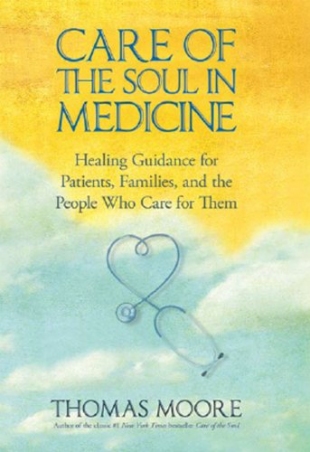Many wonderful and salutary things happen in hospitals every day. Many doctors and nurses are angels in disguise contributing to our healing in ways beyond our comprehension. At the same time, the medical system is deeply flawed, and medical centers perpetuate limitations and mistakes that could and should be rectified. Changes in what care means could transform not only the experience of patients, but also the experience of their caregivers.
For many years, Thomas Moore, the bestselling author of Care of the Soul and many other books has spoken at hospitals, hospices, medical schools, and conferences about the healing arts. In this capacious volume, he presents what is involved in treating patients as whole persons — taking into consideration body, soul, spirit, and their world. He posits the need to see medicine as a holistic treatment of sickness, to transform the healing environment so that it can nurture renewal, and to help patients realize their rights and deal with the pressures and emotional distresses of a hospital stay. He also discusses how doctors, nurses, and other medical caregivers can be more soulful and reverent in their encounters with patients. All of these themes combine to suggest that the healing arts can expand to "a grander context and bigger vision."
Moore gives an excellent summary of the tense and often nightmarish process of entering a hospital. Most likely, you are already filled with anxiety, dread, and uncertainty. Instead of allaying your fears, the standard process starts with money issues, signing documents involving insurance and credit cards. More stress. A questionnaire is filled out, and a plastic band is put on your wrist. Moore asks: "Are you a patient or an inmate? Is this a hospital (meaning a place of hospitality) or a prison?" After leaving all your clothes and other possessions in a bag and donning a ridiculously skimpy gown, you truly do feel like you have entered an underworld where nearly everything is designed to make you feel uncomfortable.
Moore suggests that hospital environments be transformed from modern, sterile, and functional spaces into ones that employ fountains, plants, a wall of water, paintings, sculpture, Zen gardens, photographs of the natural world, soundscapes, and even aromatherapy. In order to make the most of the hospital experience, much more thought and creativity must be put into the soothing and nurturing qualities of the environment. One the things we found distressing when we had to stay in the hospital after surgery was the noise pollution. No hospital anywhere should allow televisions to be blaring in rooms where there are two patients. Just think about the absurdity of resting in bed after a serious and painful operation and having to listen to a talk show with guests screaming their heads off at each other! Moore suggests that learning how to be quiet and understanding its value to health and healing must be essential elements in a health-care worker's education and training. He proposes courses in silence, something we also think would truly change attitudes in the hospital.
Moore believes that the spiritual well-being of a patient can be enhanced during a hospital stay by visits from a chaplain, quiet time in a meditation room, religious pictures or sacred objects on a bedside table, tapes of spiritual music, readings from sacred texts, and more. He also writes about the importance of nutritious and natural food, the attention that could be paid to dreams (indigenous peoples can teach us a thing or two about this), the role of imagery and imagination, the presence of eros, the time needed to confront the limitations of the body and the reality of death, the reliance upon the prayers of family and friends, the delight in community, and the expression of gratitude to nurses and doctors who have looked after you. All of these help make a hospital stay more soulful and meaningful.
In his advice to doctors, Moore warns against the kind of arrogance that comes with seeing their work as an impersonal, science-dominated health care that will not expand to include alternative approaches: "Integrative medicine is a natural doorway for letting soul and spirit into the medical world. Massage, diet, hypnosis, meditation, yoga, and acupuncture presuppose a whole person. They ask that we consider pleasure, relaxation, and spiritual practice as implicated in illness and health."
Certainly, we can understand the frustration of doctors with medical education costs, insurance bureaucracy, and malpractice pressures which complicate and bring stress into their mission to be of service to others. Moore puts forward some pathways to the spiritual rejuvenation of doctors, nurses, and other health-care workers including friendship, nature, vacations, beauty, and self-analysis. He also would relish it if physicians could take more seriously the mysteries of life and death that challenge us all to see the limits of who we are and what we can do.
Care of the Soul in Medicine is a very timely book given the amount of coverage in the news and the media about America's health care system. In our profile of Moore in the Living Spiritual Teachers Project, we refer to his emphasis on the importance of the spiritual practice of imagination. This book is a wonderful example of that. He puts on an impressive display of creative ideas about adding beauty, meaning, reverence, hospitality, mystery, and silence to enhance and deepen the healing arts.
